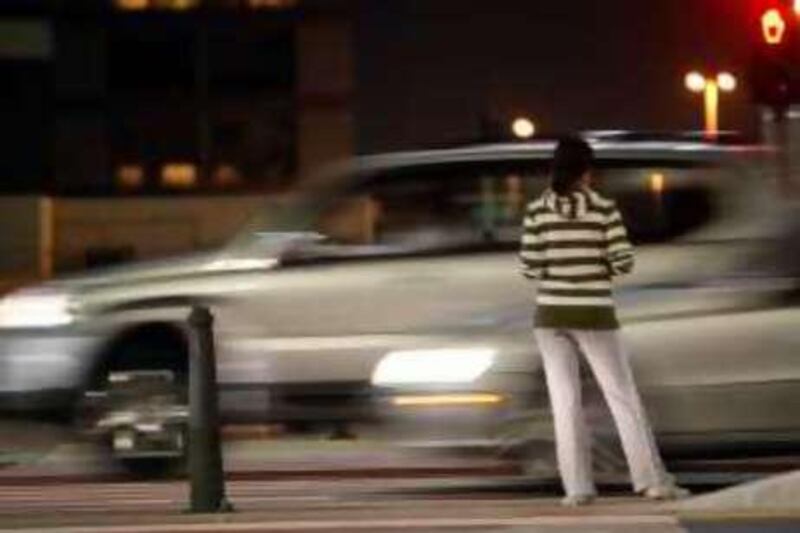DUBAI // Mohammed Ebrahim paid about Dh7,000 in traffic fines last year - most of them for speeding. The 21-year-old Emirati student knows he has to slow down to become a safe driver, but insists he has already rid himself of other dangerous habits, such as driving aggressively. "I am not an aggressive driver and I do not intimidate other drivers on the road," he said.
"I follow certain traffic rules because I am convinced it is the right thing to do. But others, like putting the safety belt on, I only [do] to avoid fines. Many people I know would not have used safety belts if it was not for the fines." He is just one of a number of young Emiratis who said in interviews that it may take time to change the nation's driving habits. A stunt-driving incident on Sheikh Zayed Road on May 1 has brought new attention to the issue. Dubai Police have referred two Emiratis, in their early 20s, to prosecutors on charges of endangering the lives of others. It will be the first time a traffic offence has been heard in a Dubai criminal court.
The suspects were performing "doughnuts" - circular tyre burnouts - and drove a 4x4 while balancing on two wheels in the middle of the heavily travelled thoroughfare. The incident was caught on video and posted on the internet. Dr Yousif al Hosani, a physician and road safety expert, said such behaviour could be the result of over-confident drivers thinking there is a low risk of crashing and injuring themselves. He also suggested there was a lack of community support for traffic safety campaigns and that there is low enforcement of road rules.
"Local drivers are largely wealthy young men living in a country that they know well and anxious to show their mastery of powerful and expensive motor cars, and impress their peers," he said. "In this context, traffic fines have little deterrent effect on the behaviour. "In addition, local drivers tend to be overconfident in their driving skills and strongly believe that their lives are in the hands of Allah."
It is not only men who drive dangerously, others say. Noor Abdullah, a 25-year-old interior designer, said one of her female friend carries out driving stunts to feel adventurous. Women tend to speed just as much as men and authorities should do more to curb such behaviour by both sexes, she said. "They need to have a comprehensive plan to crack down on the perpetrators, including prison, and not only hand out fines." .
Dubai traffic police have carried out more than 120 safe-driving campaigns in the past 10 years. The efforts had paid off for a big chunk of society, said Major Gen Saif al Zafein, the head of the department. "For a certain category of drivers, hefty fines are the only deterrent methods for their bad road behaviour," he said. However, more enforcement will not address the root cause of aggressive driving.
Dr al Hosani recommended a media campaign addressing risk factors, behavioural therapy and rehabilitation for traffic offenders to help create a safe-driving culture among younger motorists. Among them is Salem Mohammed, a 25-year-old student, who said he has tried to reform his aggressive style of driving. "I used to be more reckless, but with time and experience you change," he said. "I used to tailgate and use the [high beams] to force people to move out of my way, but I stopped doing this a year ago as I realised that such behaviour puts pressure on the motorist in front of me and might cause an accident."
However, speed is still an issue for Mr Mohammed. He paid about Dh3,000 in traffic fines last year, most for speeding. "Traffic awareness among us is still very new and it will take time to make safe driving a way of life," he said. For most, the first step in addressing an issue is admitting that it exists. Simon Labbett, the regional director of the UK-based Transport Research Laboratory, believes that it is a key part of reforming the local road culture."When people with aggressive driving behaviour start admitting that they have a problem they become more [receptive to doing] something about it, and this is fundamental for change," he said. wissa@thenational.ae
Among nationalities, Emiratis rank third in causing fatalities on Dubai roads, police say. In the first quarter of this year, nine out of 62 people who died on the roads were killed in crashes caused by Emiratis, compared with 12 in the same period last year. Indians and Pakistanis were first and second respectively. The overall number of deaths on the emirate's roads during the three months fell from 69 in same quarter last year. Number of people causing fatal accidents by nationality in the first quarter of this year: Indians 16 Pakistanis 11 Emiratis 9 Egyptians 5 Syrians 5 Safety belt violations: January 1 - May 30, 2009: 16,596 January 1 - May 31, 2010: 49,470 Source: Dubai Police






